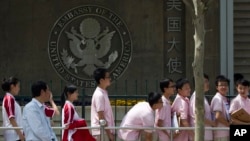Student Union
What Will Bring Young Voters to the Polls?
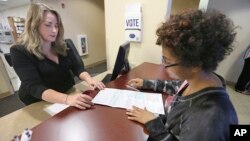
Younger Americans don't want to come to your party — your Democratic or Republican party.
Younger voters 18 to 30-ish — which includes Generation Y, Millennials, post-Millennials and Generation Z — traditionally skew more toward liberal candidates than conservatives. But lately, many are registering as independents. Others, specifically young white males, are drifting toward the red camp.
Political divisiveness and fear about the future left to them by baby boomers is the problem, they say.
"I don't feel good about it," Charlie Owens, 23, of Chattanooga, Tenn., told VOA about the health of the U.S.
"Our nation is divided by parties," said Emily Pitts, 24, of Charleston, S.C. "We are not united as Americans."
"It's a hot mess," said Ashley Ashe, 22, of Greenville, S.C.
Research leading up to the Nov. 6 midterm elections says young voters are dismayed about the country's polarized, contentious politics. A key issue for many is gun violence. Mass shootings — like the one in which 17 people were killed and dozens were injured at a high school in Parkland, Fla., on Feb. 14 — have weighed on young people; they’ve grown up in a country where the level of gun violence exceeds those in all other industrialized nations.
"These young people, born after the mid-'90s, grew up with the internet, smartphones and social media while watching news of school shootings and having active-shooter drills in their own classrooms," wrote Kei Kawashima-Ginsberg, director of the Center for Information and Research on Civic Learning and Engagement (CIRCLE), a research group focused on the political views of young people. It’s part of the Jonathan M. Tisch College of Civic Life at Tufts University in Medford, Mass.
"The post-Parkland movement against gun violence stands out as one led by this generation and explicitly focused on voting as a way to achieve change," she said.
Registration drive
Parkland students ignited registration of young voters this year, and the midterms will tell whether the effort has been able to change the political landscape. Six weeks after the Parkland attack, they organized 200,000 protesters against gun violence in Washington and thousands of others at similar events nationwide.
Then they took to the road, launching a two-month bus tour across the U.S. to register voters of all ages.
TargetSmart, an organization that crunches political data, says youth voter registration has "surged" in Pennsylvania, a state key to the success of Donald Trump's presidential campaign in 2016. It also reports increased registration among youths in Arizona, Florida, Virginia, Indiana and New York.
But will it be enough to bring young voters to the polls?
Gun violence “is definitely an issue that is important to me," said Katia Portela, a freshman from New York City at American University in Washington. "The Parkland students have been just so inspiring — going out and lobbying, really standing for what they believe in, even after that traumatic incident."
Other topics of concern among youths are climate change, health care and student debt, issues that did not burden their parents and grandparents to the same degree, if at all.
The validity of science about global warming that was once generally accepted has been questioned by some politicians. The Affordable Care Act, enacted under then-President Barack Obama, has been tossed about in political debate as, well, unaffordable. And student debt has been climbing for decades, leaving today's younger Americans with choices between student loan payments or marriage and children, but not both.
"I feel an immense burden in terms of the swelling federal deficit, the inaction on climate change and the threat of war with Iran," lamented Alex Eliades, 24, of Washington.
While a Harvard University Institute of Politics poll shows that nearly 60 percent of young Americans are fearful about their futures, they are not without hope.
Power to make change
"Four out of five young people (81 percent) say that as a group, they have the power to change things in this country," CIRCLE reported. "More than half of young people (54.8 percent) say they believe this election's outcome will have an impact on everyday issues."
Portela, the American University freshman, echoed those sentiments.
"Things are happening in this world, and if we want change, we can't just wait for it to happen," she said. "We have to be the change we want to see in the world."
Enthusiasm aside, Richard Fry, senior researcher with the Pew Research Center in Washington, was cautions about pre-election turnout predictions.
Generational comparisons over time are "rough at best," because "each midterm election has its own unique set of issues and national conditions, which undoubtedly influence overall turnout," Fry wrote on Pew's website about the fallibility of polling.
"If the younger generations were to turn out to vote at the rates boomers did when they were younger, post-Millennials, Millennials and Gen Xers would account for the majority of votes."
See all News Updates of the Day
- By VOA News
International students discuss US campus culture shock

International students at De Anza College in Cupertino, California, talked about culture shock in an article in La Voz News, the student newspaper.
"It felt like a major culture shock. Everything was so different, from academics to mannerism," said a student from Mexico.
Read the full story here.
These are the most expensive schools in the US
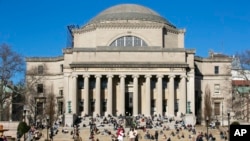
High tuition costs along with housing and food expenses can add up for students at U.S. colleges and universities.
MSNBC looked at the most expensive schools in the country, with one costing more than $500,000 for a bachelor’s degree. (June 2024)
Uzbekistan students admitted into top US universities
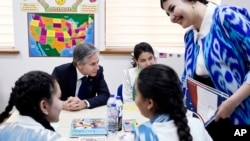
Students from Uzbekistan are among the international students admitted to top colleges and universities in recent years.
Gazata.uz profiled some of the Uzbekistan students attending Harvard, Brown, Princeton and other U.S. universities. (June 2024)
- By Stella Hsu
Reports of visa checks, deportations worry Chinese STEM students in US
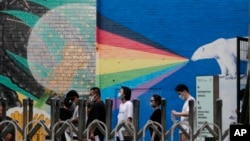
Geopolitical tensions and growing competition in tech between the United States and China appear to be spilling over into academia despite commitments from the world’s two biggest economies to boost people-to-people exchanges.
The United States remains the top choice for Chinese students seeking to study abroad with nearly 300,000 studying in American colleges and universities during the 2022-2023 school year. But reports of some cases that students and professors are facing extra scrutiny while passing through immigration and the deportation of others are raising concerns.
For Chen Xiaojin, a doctoral student studying semiconductor materials at a university in the Washington, D.C., metropolitan area, it has been six years since she returned to her hometown of Beijing.
At first, it was the COVID-19 pandemic that kept her from going home. But over the past two years, she has been deterred by accounts of Chinese students majoring in science and engineering being required to reapply for their visas upon returning to China.
She also says she is worried by reports over the past six months of Chinese students being deported, even at nearby Dulles Airport.
"My current research is relatively sensitive, and my boss [adviser] is getting funds from the U.S. Department of Defense, making it even more sensitive,” she told VOA. "I am afraid that I won't be able to return after I go back [to China]."
Chen says that if she did return to China, she would have to apply for a new visa.
In a report late last month, Bloomberg said it had found at least 20 Chinese students and scholars with valid visas who were deported at U.S. Customs since November and barred from reentry. The U.S. Customs and Border Protection Agency does not release relevant data.
Immigration attorney Dan Berger represented one Chinese student who was deported late last year. He tells VOA Mandarin that the student studied biological sciences at Yale University and was about to complete her doctorate.
She visited her family in China and got a new visa but was deported by customs at Dulles Airport and barred from reentering the country for five years. Berger said he did not see anything suspicious in the transcript of the conversation between the student and the customs officer.
"We have seen what seems like a pattern over the last six months of Chinese PhD students being turned around…. more than I've seen in quite a while," he said.
Matthew Brazil, a fellow at the Jamestown Foundation, said neither country seems willing to explain the situation. However, he believes that in most cases, the United States must have valid reasons for blocking visa holders from entering the country.
In some cases, the student’s background may not match what is written on the visa application. In other cases, customs agents may also find something that the State Department missed, and once they see it, they are responsible for taking action.
"I wish the Chinese side would be specific about their students who were refused entry,” he said. “The fact that both sides are mum on details and that the Chinese side is engaged with the usual angry rhetoric means that each has security concerns. And that says to me that there was good reason for the U.S. to stop these particular applicants."
Brazil also sees a connection between the entry denials and export control regulations issued by the United States in October 2022 that restrict China's ability to obtain advanced computing chips, develop and maintain supercomputers, and manufacture advanced semiconductors.
U.S. Customs and Border Protection is one of the law enforcement agencies authorized to investigate violations of export control regulations, he said.
"Beijing's intelligence agencies are known to focus attention on PRC [People's Republic of China] students and scientists headed abroad who study or work on dual-use technologies controlled under the Export Administration Act — compelling Chinese students and scientists to report on what they've learned when they return to China on holiday,” he said. “This has been true for decades."
Bill Drexel, a fellow for the Technology and National Security Program at the Center for a New American Security, said the U.S. government did find some cases where students tried to steal strategic technology for China.
"I think it would both not be surprising that they found some really questionable or incriminating evidence for some students,” he said. “It would also not be surprising if, in their hunt for really solid evidence, they also may have made some mistakes on other students.”
Drexel adds that “it’s just kind of an unfortunate fact of the time that we live in and the tactics that the CCP uses when it comes to these measures."
In a post on X in early May, U.S. ambassador to China Nicholas Burns tried to dispel concerns about visas and entry to the United States for students and scholars. In the post, he said "99.9% of Chinese students holding visas encounter no issues upon entering the United States.”
In an interview with The Wall Street Journal Monday, Burns said it is China that is making it impossible to promote people-to-people ties. Burns told the Journal that students attending events sponsored by the United States in China have been interrogated and intimidated.
He also said that since U.S. President Joe Biden and China’s leader Xi Jinping held their summit in San Francisco last year, China’s Ministry of State Security and other agencies had interfered with Chinese citizens’ participation at some 61 events.
At a regular briefing on Wednesday, Chinese Foreign Ministry spokesperson Mao Ning dismissed those accusations, saying that they did not “reflect reality" and that went against key understandings reached by both countries’ presidents in San Francisco.
“The United States, under the pretext of 'national security,' unjustifiably harasses, interrogates, and deports Chinese students in the U.S., causing them significant harm and creating a severe chilling effect,” Mao said. “The image of the United States in the minds of the Chinese people fundamentally depends on the actions of the United States itself.”
Drexel said he believes Burns’ comments about visas and students' willingness to study in the U.S. still ring true.
“On balance, it's still the case that American universities are overwhelmingly warm towards Chinese students and want them in large numbers," he said.
However, Berger, the immigration lawyer, is concerned about the chilling effect recent cases involving Chinese students could have.
"In general, we are being more careful about advising Chinese graduate students in STEM fields about traveling and letting them know that there is some small risk,” he said.
Even though the risk is small, it does seem to be real at the moment, he said.
Adrianna Zhang contributed to this report.
US federal judge blocks new regulation targeting for-profit colleges
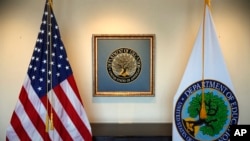
A federal judge in Texas has blocked a regulatory provision targeting for-profit colleges that was scheduled to take effect in July 2024.
Times Higher Education reports that the rule, which would affect student loans, was challenged by for-profit institutions. (June 2024)





